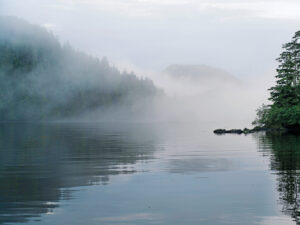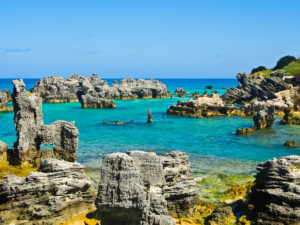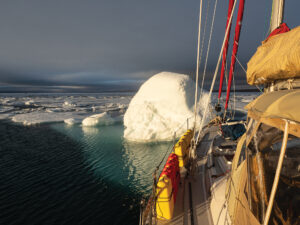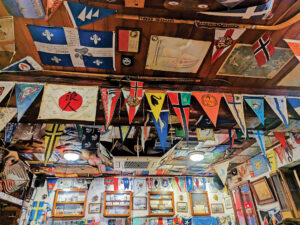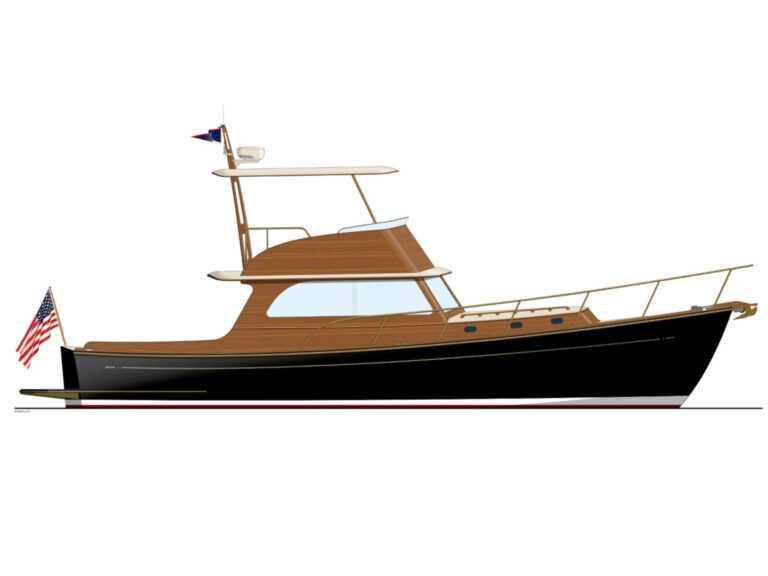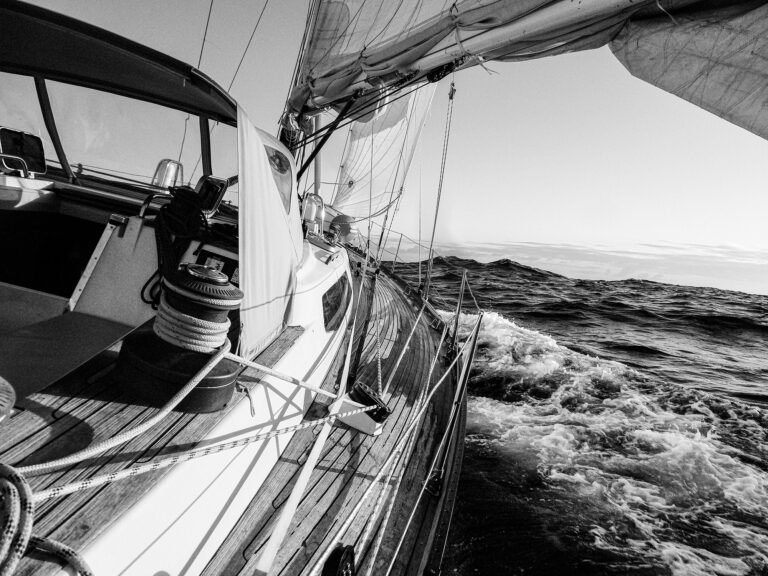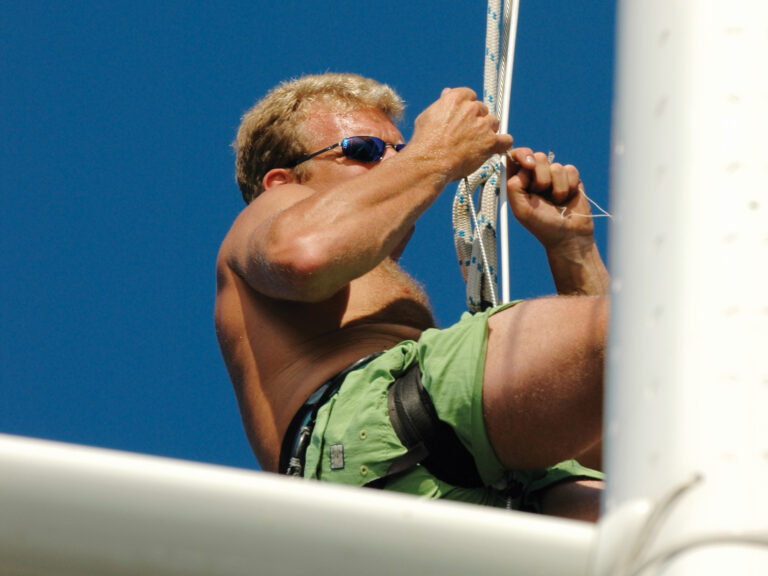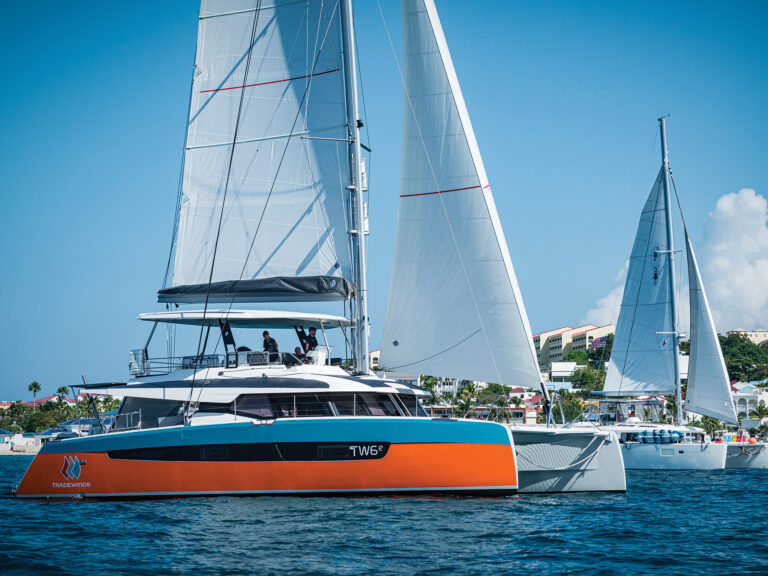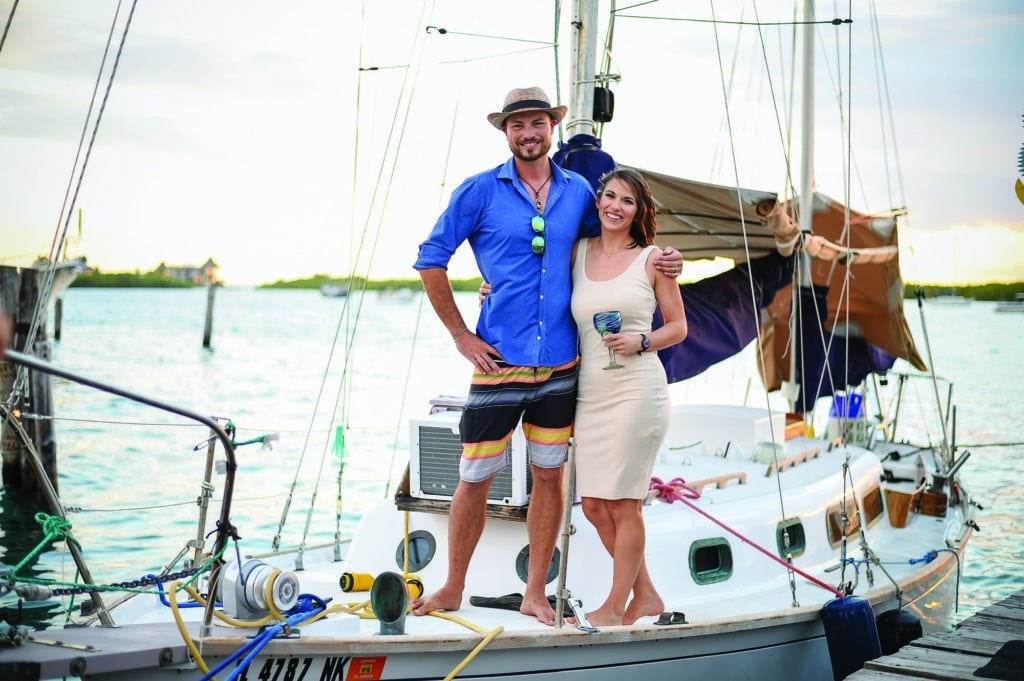
You know that sickly feeling you get when you leave your home in the morning, come back in the afternoon, and it’s gone? No? You don’t?
Well, I do.
It was a hot, calm morning on the western edge of the Yucatan Channel. The moderate easterly breeze that had carried us here from Cabo San Antonio, Cuba, had faded, and now the flat sea and hotel-filled skyline of the Riviera Maya baked under the bright blue sky. I was on deck hiding in whatever shade I could find as Desiree, my fiancee (now wife), spent her off watch asleep below. The tightly sheeted mainsail gently slatted back and forth as Atticus, our 1963 Allied Seawind 30, motored through the glassy water. Fishermen waved as they sped past in their heavy wooden pangas bound for Isla Mujeres, our destination and port of entry into Mexico.
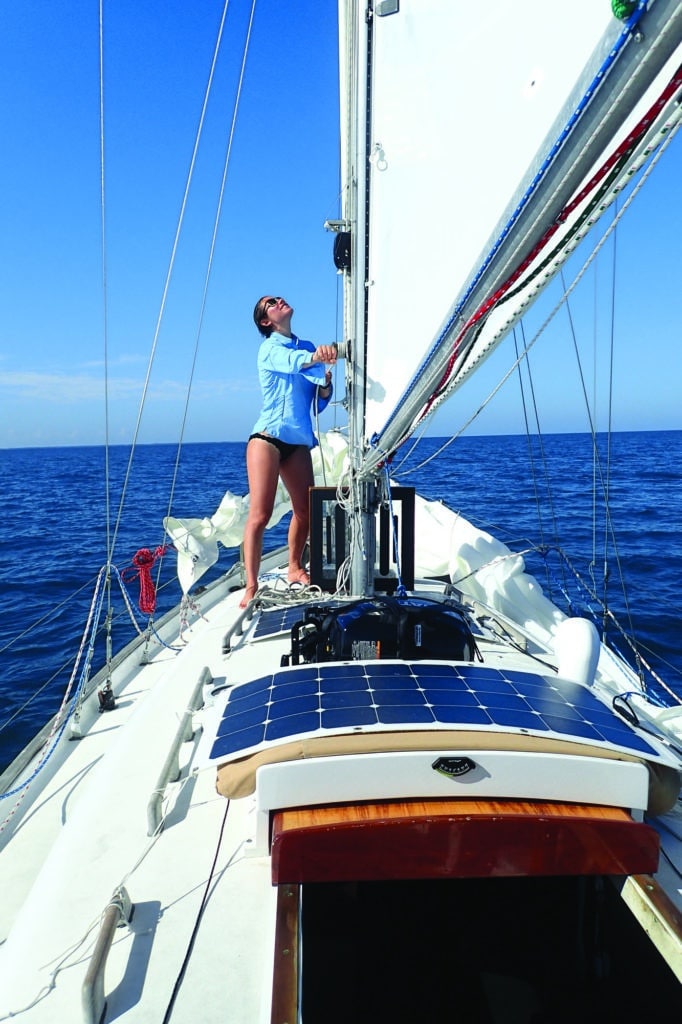
Our adventure began two months earlier when we sailed from Florida to Cuba with only $2,000 and the goal of working while we cruised. We both had plenty of experience working on boats, but we were still intimidated by the gigantic leap of doing freelance boatwork for other cruisers in foreign countries. How much would people be willing to pay us in a developing nation? How would we source materials? Would people even hire us? As we dropped the hook upon arriving to Isla Mujeres, these questions led us to seriously wonder if our goal was achievable. I could already feel my nightly bout of anxiety beginning to build in my chest.
That night, the humid stillness of the day was blasted away by a cold front with sustained 25-knot winds that howled through the anchorage from the northwest, its only exposed quarter. As newbie cruisers, it was our first experience being anchored out in a blow with the Q flag still up, and I was under the impression that it was illegal to delay checking into a country once we had arrived. The next morning, we figured the best course of action was to go ashore first thing, officially check in, and get back to the boat as quickly as possible. We duly headed in and, after a four-hour bureaucratic runaround, we were casually informed that there was some trouble out in the anchorage and that we should go check on our boat. So while Desiree finished the check-in process, I walked back to the dinghy dock telling myself over and over that I had nothing to worry about.
Conditions in the harbor had gotten sportier, and I had to be careful in our 8-foot RIB to time my approach up and over each wave. As I slowly made my way downwind through the anchorage, I struggled to climb the crests one at a time and then plow down into the trough. Motoring past the last boat in the group, I laughed at myself for somehow slipping right past Atticus. I turned around and started back the other way, my palms beginning to sweat as I pounded into the chop. Motoring into the wind, my clothes soon became soaked, the salt water stinging my eyes as I searched. By the time I made it to the other side of the anchorage, my pulse began to quicken. I stood up in our dinghy, balancing against the chop, desperately looking side to side, scanning the relatively small anchorage.
That’s when I felt the floor pull out from under me. Our home—and all our possessions, the sum total of our meager life savings and the culmination of three years of hard work—was nowhere to be seen. Then I heard a loud whistle from the boat next to me. A man popped his head out from under his cockpit enclosure.
“Looking for your boat?” he hollered.
“Yes!” I yelled back over the wind, trying to hide my desperation.
“It’s at El Milagro,” he said. “Over there.” He pointed to a nearby marina. “It’s tied up just beyond that sailboat on the left.”
To my horror, there was Atticus, listing 20 degrees and pounding broadside into a shallow sandy area just off the marina, a spiderweb of lines keeping her from being pushed farther onto the beach. As I approached, I could hear a heart-stopping creaking sound coming from those lines with each passing wave. My first glimpse of damage was a stanchion that had been severely bent like a piece of steamed oak. I was in too much shock to properly analyze the situation, and I assumed that the damage was prolific. My fears were confirmed when I saw the stern rail, a corner of which had been crushed into a V shape.
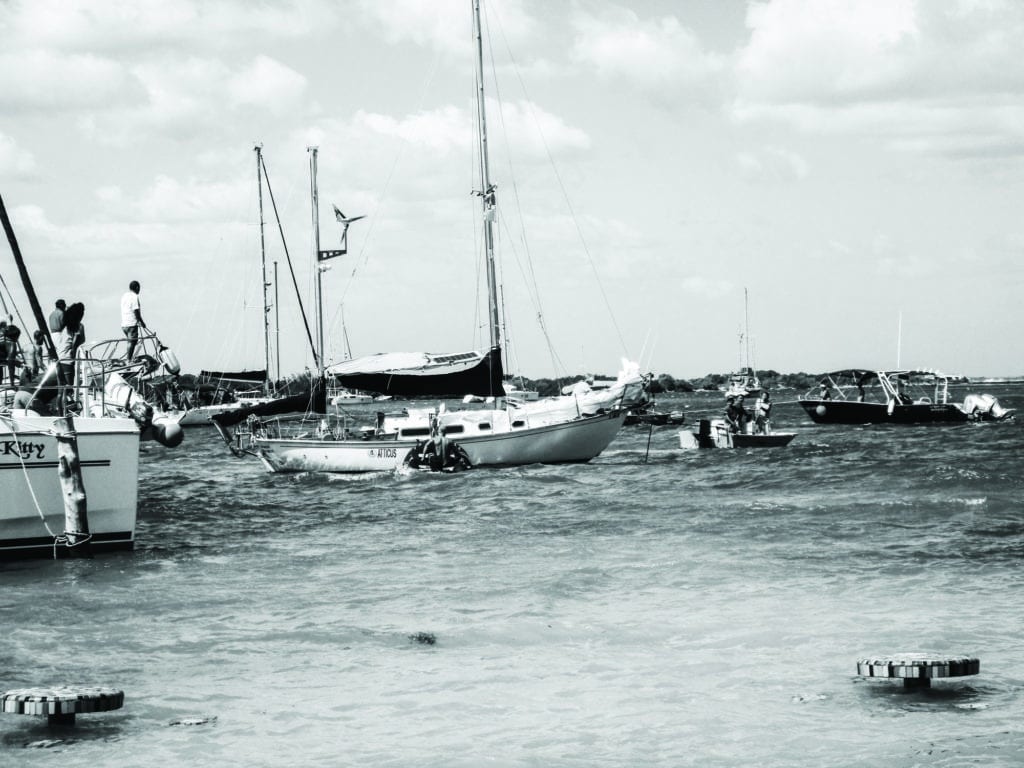
On the verge of panic, I noticed that a crowd had assembled on the dock. Atticus seemed to be staying put, so I dinghied over to ask for advice and/or assistance. Embarrassed and in shock, I climbed onto the dock, pointed to Atticus and declared, “I’m that guy.” The crowd directed me to Eric, the owner of the marina. I walked over to him fully expecting to be barraged with anger, insults and perhaps a lawsuit. I began to apologize profusely, but after a minute of blabbering, he interrupted.
“OK, man, just calm down,” he said. “Don’t worry, the damage to the other boats is minimal—literally one scratch in some gelcoat, that’s it.”
Minimal damage…one scratch… I was slow to match his words to their meaning.
“Your boat, although not ideally moored, isn’t going anywhere. Stay here for the night until the winds die down. You’re welcome to use the showers.”
Showers?
“Also, we’re having a barbecue tonight. Normally it costs $15, but the food is on me. Now have a beer and relax.”
Barbecue?!
Only a couple of weeks earlier, we’d awoken to our first morning in Havana’s Marina Hemingway. We ate a quick breakfast and stepped out into the crisp tropical winter air to hail a shared taxi, locally known as a maquina. We didn’t know how to identify one, so we asked a passerby which cars to flag down, and he pointed at an old, beat-up, darkly painted Ford sedan from the early ’50s, and said any car that looks like that is a maquina. We raised our hand and the jalopy pulled over. We both crammed into the front seat with the driver and were whisked away toward Old Havana.
We spent the day rambling around the narrow streets and crumbling colonial buildings, taking in the vibrant colors, strong odors, and overall vivaciousness of a city that was literally falling apart. We approached one old colonial building with 10-foot-tall wooden doors, above which stood half a balcony, slanted at a precarious angle with red stains running down from the rusting rebar; the other half of the balcony was at our feet in a pile of rubble. We assumed the building was condemned, but inside we found a functioning nail salon with a young girl sitting with her hands laid out on a table, gossiping with the nail technician who turned toward us and asked, “En que puedo servirle?” What can I do for you?
As the afternoon wore on, we took a ferry across Havana harbor, and with the sun dropping low in the sky, I urged Desiree to hurry up toward the Fortaleza de San Carlos de la Cabaña, which was still another mile up the hill. As we passed a large statue of Jesus, Desiree asked if we could stop to check it out.
“No, it’s getting late,” I said picking up the pace.
“What’s the rush?” Desiree asked, her face damp with sweat.
“Just want to make it for sunset,” I replied. “That’s all.”
We rushed through the fort’s large gate, speed-walking past the gift shop and lookout posts, the stone walls passing by in a blur. “Where are we going?” Desiree asked, out of breath.
We made it to the western wall that overlooks the city, with a picturesque view of the sunset.
“Let’s get a photo,” I said.
Desiree stood in front of one of the fort’s large old cannons, with the city behind her and the sun about to touch the horizon. I set the camera down on another aged gun, framed the shot, and hit the red video record button. Then I awkwardly skipped over next to her, got down on one knee and, ring in hand, asked her to marry me. I think we both knew that I was asking her for something more: to commit to a life of insecurity and perhaps even financial instability, but also adventure. I was really asking her to commit to a life at sea. As the last rays of the Havana sun turned the scene a soft orange, she said yes.
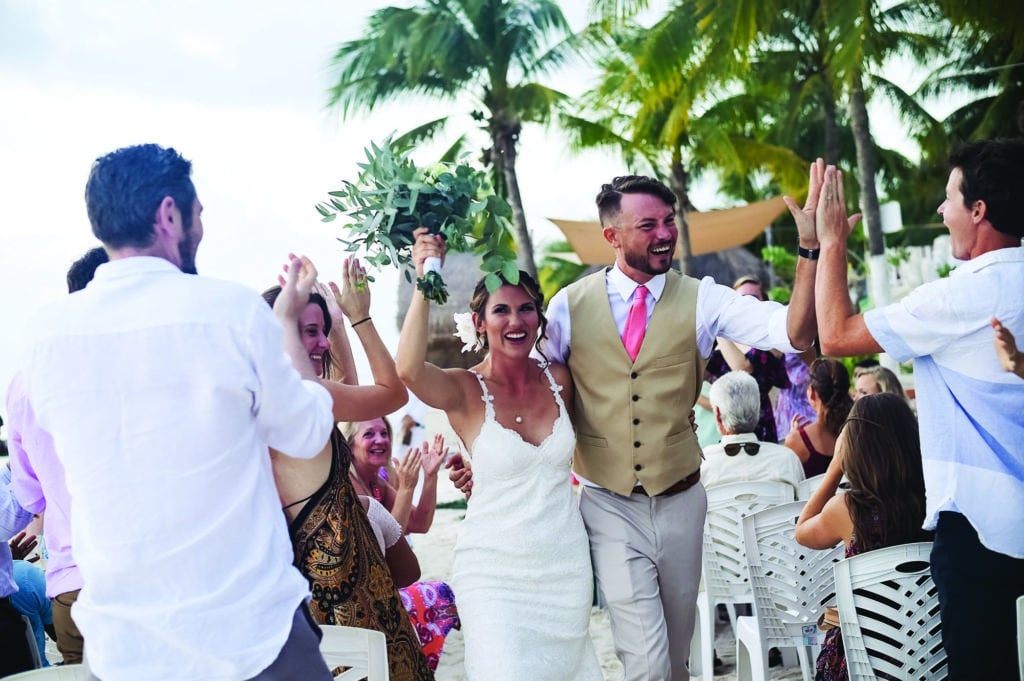
Soon after, we set sail from Havana to cruise the northwest coast of Cuba. Although we had done a fair bit of sailing aboard Atticus back in Florida, the next couple of weeks was our very first experience cruising a foreign coast, with the constant fear of bad weather and poor anchorages, with reef passes and rounding headlands, with living on the move in unfamiliar waters. Those weeks rank among the most stressful I have ever experienced…and possibly the most thrilling of my life.
One night, after running aground for the first time while making our way into a very protected mangrove lagoon, Desiree and I turned off the lights in the boat, and sat in the cockpit in complete and utter darkness. There was no moon that night, and the stars were covered by an overcast sky with zero light pollution in such a remote part of the coast. The air was so still and the night so silent that I felt as though the universe had melted away, and all that was left was the sound of Desiree’s voice and the feeling of her hand in mine.
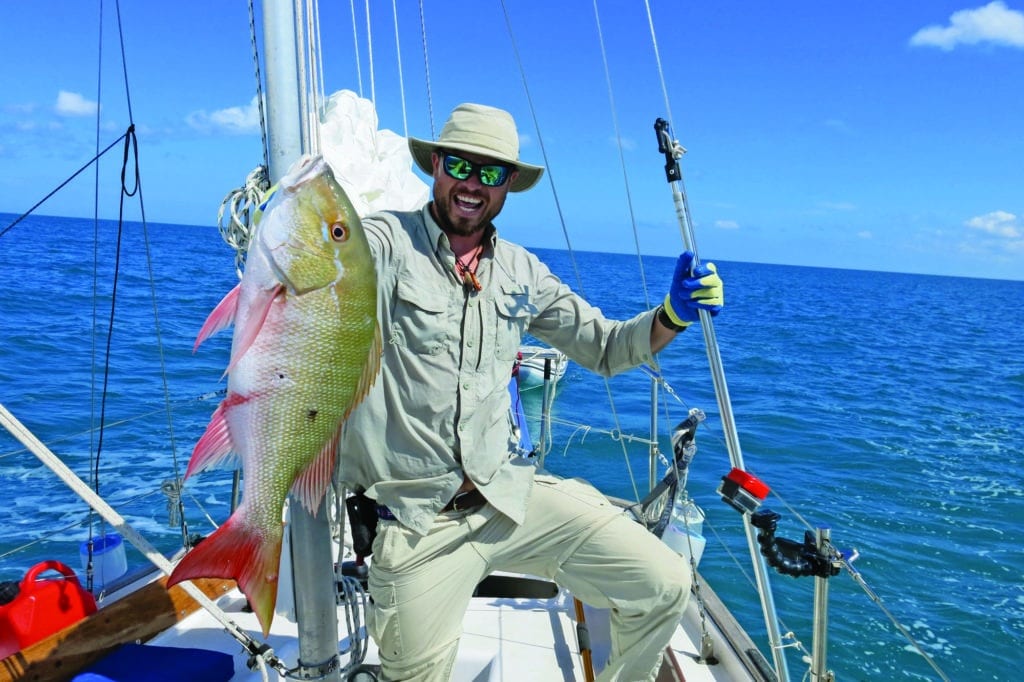
The next day we continued west and spent several days anchored at Cayo Levisa, where our daily routine consisted of breakfast, equipping the dinghy for a long day of exploration, snorkeling, spearfishing, cleaning the fish, rinsing the gear, cooking dinner and going to bed exhausted. One morning we awoke before dawn and, in the twilight, motored our dinghy to shore for a sunrise beach walk. With the dark sky giving way to dim hues of red and yellow, we walked through sand, damp underfoot with the evening’s dew.
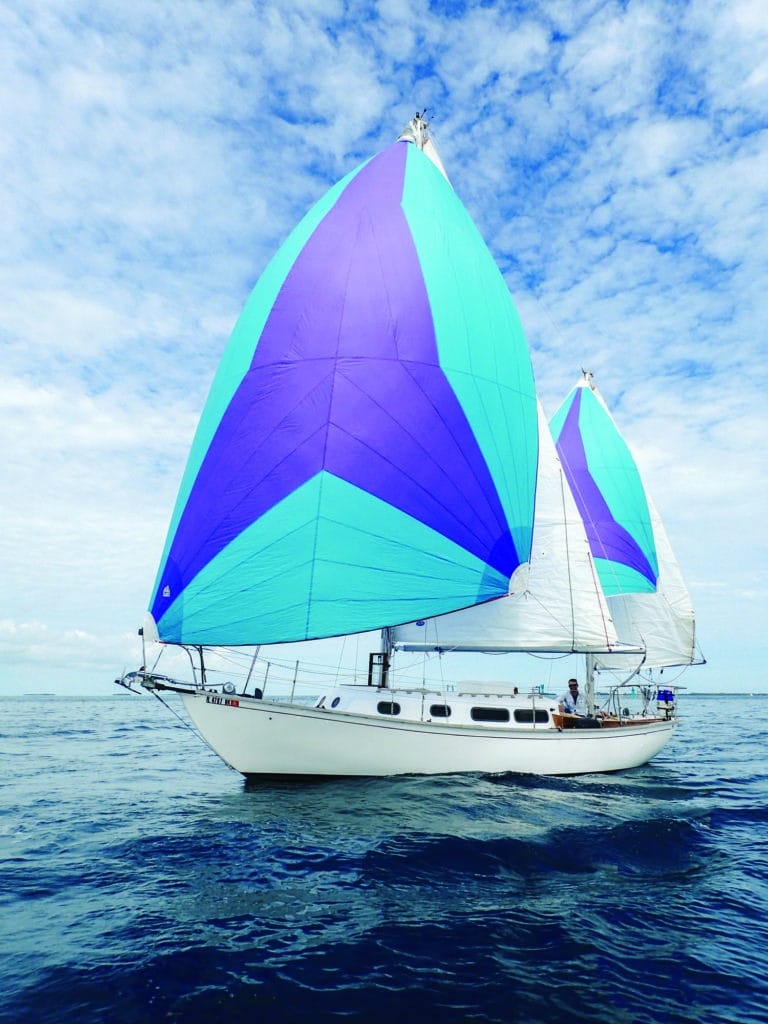
Desiree wrote the word “Atticus” in the sand which, along with our footprints, were the only imperfections on the untouched beach. As the sky lightened and the sun broke the horizon, we walked on, and Desiree gave me a detailed description of the plot of Dirty Dancing, which she could not believe I hadn’t seen. About 30 minutes into her story, I stopped to watch a dozen hermit crabs busying themselves along the shoreline as little wavelets broke upon the calm shore.
“And that’s when Patrick Swayze walks over to her parents and says,” she yelled, pointing an accusing finger, “‘Nobody puts Baby in a corner!’”
I had never been happier.
When I finally got a chance to survey the damage sustained by Atticus after our dragging incident, I was astonished to find that the bent stanchion and stern rail were the only casualties. I was thrilled that the damage was so minimal but doubted that we could afford even these minor repairs. A few days later we went to speak with Johne, a welder and fellow cruiser, to get a quote from him. As we walked down the dock, I wondered if we should just return to the United States and give up this stupid notion that we could make money while we cruised. We found Johne sitting with his wife, Aeon, on the aft deck of their 61-foot trawler, Second Star.
“Been there, done that,” Johne said.
“You dragged anchor here?” I asked.
“Oh, yeah. We went ashore one day about seven years ago and came back to find the boat tied up to a marina,” he said. “It’s a mistake that many cruisers make early in their career, not prioritizing staying with the boat in a blow. People just don’t realize how terrible the holding is here until they experience it for themselves.”
“So, welcome to the club,” Aeon said.
Desiree laughed and said: “Thanks! Now I don’t feel like such a loser.”
“Oh, you’re still a loser! But at least you know there are a lot of other really cool people in that really cool loser’s club with you,” Aeon said, smiling.
“Sometimes you watch the show,” Johne said, “and sometimes you are the show.”
Eventually the subject came up of our work experience, specifically all of the fiberglass projects I’d done refitting Atticus over the years. It also came up that we were running low on cash and were hoping to find work.
“Well, that’s what we’ve done. For the past seven years, we’ve been cruising the Caribbean and working along the way,” he said. “And I can tell you there’s more work out there than you can shake a stick at.”
“I sure hope so,” I said. The desperation in my voice was palpable. Johne looked at me silently for a moment, obviously thinking.
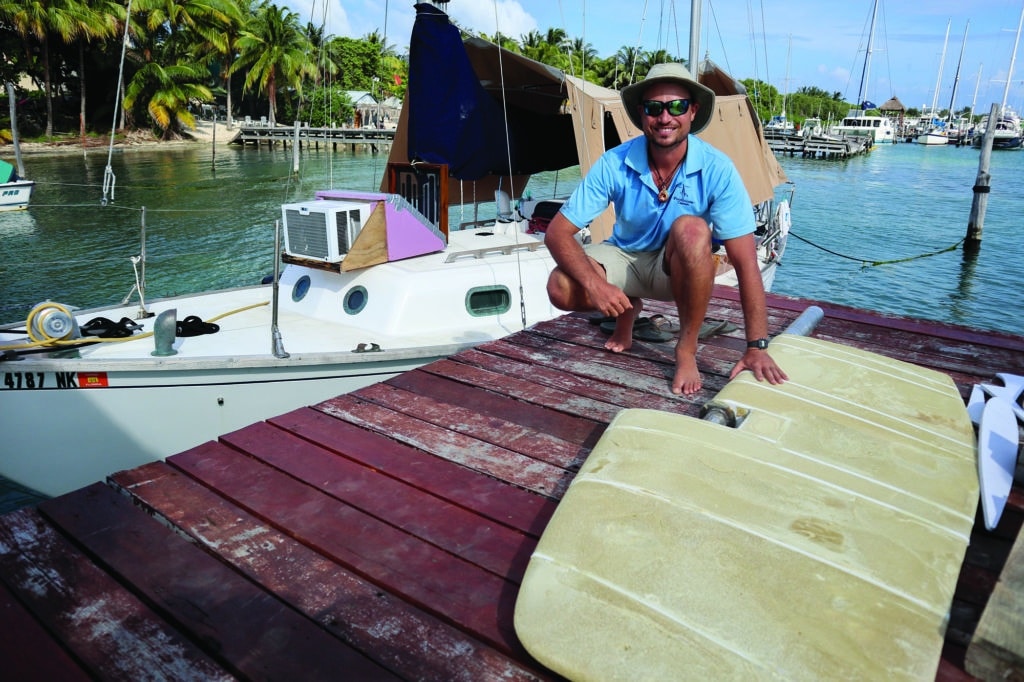
“Listen, I’ve got a job building a new rudder for a guy who hit a reef in Cuba,” Johne said. “I’m not a fan of grinding fiberglass, so if you want to help with the glassing, I’d be happy to give you the work. Can you start tomorrow at 0800?”
“Yes!”
“He’s a perfectionist, so he’s a huge pain in the ass to work with,” Aeon said. “You sure you want the job?”
“That won’t be a problem,” I said, smiling.
It took us three weeks to complete the rudder, with Johne handling the welding, me doing most of the glassing, and both of us shaping the foam. We worked well together and became fast friends. Through that summer, Johne and I built a total of four rudders for cruisers who had found the bottom in various parts of the western Caribbean, and we began to refer to our unofficial business as “The Utter Rudder.”
Meanwhile, Desiree was getting more boat canvas work than she and her little Sailrite Ultrafeed LSZ-1 sewing machine could handle. So we moved Atticus to the same dock as Second Star, and Desiree struck a deal with the marina owner to use a vacant room in the hotel as her sail loft, as well as to waive our slip fee in exchange for labor.
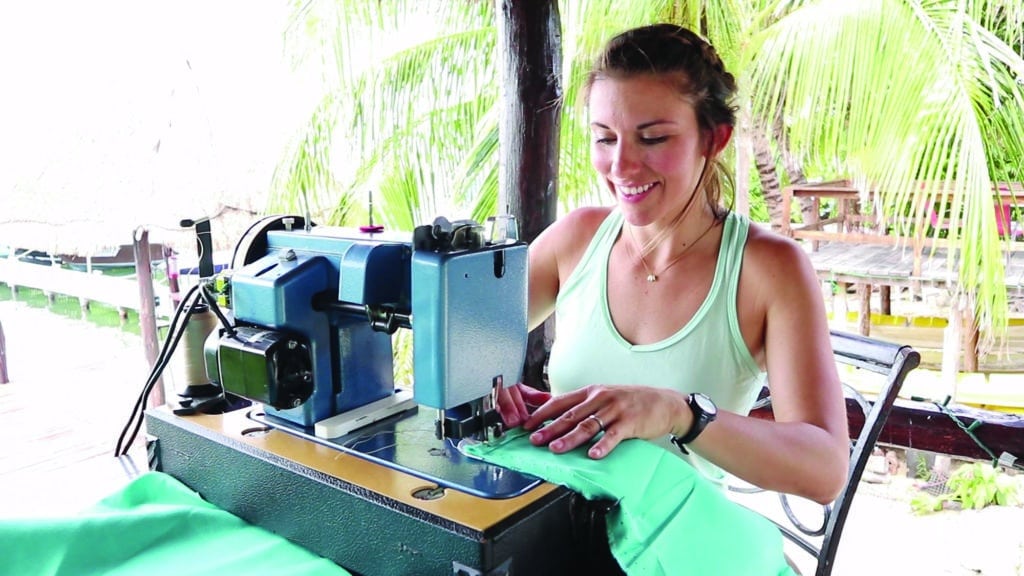
While working together, I discovered that the secret to Johne’s professional success was his merciless work ethic. One of his favorite sayings was, “If you don’t stop moving, you won’t get stuck.” In my limited experience, I had still seen a lot of potential cruisers get “stuck” and, after seeing so many people give up their cruising dreams, I began to question if cruising long-term was even possible for someone of modest means.
But Johne showed me another way. His experience sailing the Caribbean was quite different from most cruisers. While others were at the bar, he was at the boatyard. While others were touring ancient ruins, he was scouring tiendas and sourcing parts. But through his hard work and sacrifice, he was doing more than just making money; he was building and maintaining a cruising lifestyle, one that he could enjoy for the rest of his life. Johne taught me many things, but most important, he taught me how, through focus and sacrifice, not to get stuck.
That fall, we took on a massive project, building a 7-foot swim-platform extension for a 58-foot Bertram. One morning at 0750, as our crew trickled into the boatyard for another day’s work, Johne and I leaned against a work bench sipping our coffee. The sun had not quite risen above the trees and the air was not quite hot yet as we gazed at the red and pink fairing-covered extension, dreading the moment when we would both don our gloves and dust masks, grab our long sanding boards, and begin sanding the large extension by hand under the tropical sun.
“Having any fun yet?” Johne asked with a smirk, for possibly the 500th time.
I turned from Johne and stared at the arduous task that lay before us. I began to think of all the years I had dreamed of cruising, all those countless hours I spent reading the Pardeys, Hiscocks, Beth Leonard, Hal Roth and so many others. All those nights sleeping in the V-berth, on the hard, dreaming of the cruising lifestyle, and the weeks that we spent blissfully exploring in Cuba. Through it all, I had been haunted by a single question: How was I, a young man who had thrown away everything to live and work on boats, ever going to afford to cruise?
I put down my coffee, and grabbed my gloves and dust mask.
“I sure am,” I answered.
After working in Isla Mujeres for over a year, Jordan and Desiree Wicht saved enough cash to sail south to explore the western Caribbean. To watch the video of Jordan proposing to Desiree (S02E06) or to see Atticus dragging anchor (S02E11), check out their YouTube channel, Sailing Project Atticus.

